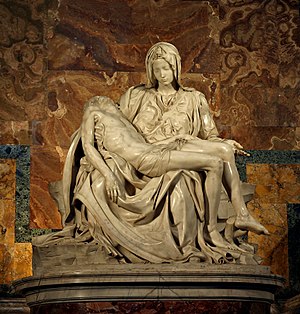I’m having trouble sleeping these days. Part of it is the
late stage of being pregnant, but the other part is the pictures that keep
running through my mind.
 |
| Not a picture of my friend |
The first is picture of a friend of mine, her significant
other and their baby, a baby who was stillborn last week, just before full-term.
In the picture, she is clutching the baby, wrapped up, close to her chest and
her SO is leaned over them both, his head touching hers and his eyes on the
baby. It is a nativity to behold.
 The second image is the Pietà, Michaelangelo’s to be specific. I
keep thinking of this image in connection with the violent deaths of the
children of Sandy Hook, Connecticut. It is likely that most of those parents
were not able to cradle the bodies of their babies- stopped from doing so
because of the cause of death and the condition of the bodies. Thus, I think of
that image of Mary cradling the grown Jesus and remembering in her mind how she
held him so many times before. I know those parents are remembering every
moment they held their children. The other thoughts that are probably running
through their minds are too hard for me to imagine. Not impossible to imagine,
but too hard for me to consider and still let go of my own toddler and refuse
to live in fear.
The second image is the Pietà, Michaelangelo’s to be specific. I
keep thinking of this image in connection with the violent deaths of the
children of Sandy Hook, Connecticut. It is likely that most of those parents
were not able to cradle the bodies of their babies- stopped from doing so
because of the cause of death and the condition of the bodies. Thus, I think of
that image of Mary cradling the grown Jesus and remembering in her mind how she
held him so many times before. I know those parents are remembering every
moment they held their children. The other thoughts that are probably running
through their minds are too hard for me to imagine. Not impossible to imagine,
but too hard for me to consider and still let go of my own toddler and refuse
to live in fear.
These images are not only interfering with my sleep, but they are
marching into the forefront of my mind as I try to prepare for
Christmas. One of the things that I wrestle with all the time, theologically
and personally, is the connection between Christmas and Easter. More specifically, the connection between Christmas and Good Friday. I do not accept
that Jesus was born, destined for the cross. I am not resigned to the idea that
betrayal and crucifixion were inevitable. My faith is anchored, beyond the
veil, in the trust that God is bigger than all things, was revealing that power
before Jesus, and that the Messiah came into the world to be the clear sign of
that power and a clear revelation of God’s expectations of creation.
Death, violent or otherwise, was never a part of God’s intentions for
creation. With our scientific minds (and I love science), we understand a cycle
of birth, decay, and death. Yet, our faith teaches that this is not preordained.
We are not born to die. We are born for life. We are gifted with faith for
abundant life. Somehow, in some way, the Christmas story is the heart of this
truth- that God came into the world in an expected way, so that we might
believe and live. When death tries to trump that truth, life wins. Love wins.
Joseph does not stone Mary. The childhood illnesses that could have claimed
Jesus’ life do not succeed. The devil’s temptations do not stand. The threats
of detractors do not hold water. The cross and tomb are not the final word. Incarnation
leads to not to crucifixion, but to resurrection. Life wins.
In this season of grieving, personal and public, for my friends, for
people I do not know, for our world, I do believe that life wins. The story of
God’s entrance into the world as one of us is not the beginning of that theme,
but the powerful plot twist that no one expected and that surprises us still.
Every death, every stillbirth, every child, every 110-year-old, is a
death that is too soon when it precedes God’s final renewal of heaven and
earth. Yet these deaths are not the final word. That Word is God’s. The Word
that has always been with God, indeed the Word that is God, is life. Life.
There comes a point where I don’t have anything else to say and so I
have to stop talking. The grief is too real. The pain is too sharp. The
explanations are weak or non-existent.
And still hope flickers.
And still we say, “Come, Lord Jesus.”
And still Life shines through the darkness. And the darkness cannot
overcome it.





2 comments:
Amen. Thank you.
Hard images, yet so much a part of the real world. Come Lord Jesus.
Post a Comment